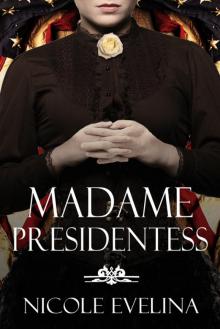- Home
- Nicole Evelina
Madame Presidentess Page 13
Madame Presidentess Read online
Page 13
My sight blurred, and I blinked as a vision took over my consciousness. I stood in the center of a spotlighted stage, speaking to throngs larger even than the crowd gathered for this convention, as Demosthenes had promised.
A flash, then I sat on a platform next to the three Fates who ran the organization. I was the golden child sent to breathe new life into a movement desperately in need of new energy.
The next thing I knew, Miss Anthony was announcing me as president of the National Women’s Rights Convention.
Another shift and the vision began to fade, but not before a newspaper headline blared the fulfillment of the highest of Demosthenes’ prophecies: “Victoria Woodhull Makes History as First Woman President.”
Yes! I will bring this movement to the masses. I will show them that a woman like them, raised in the dirt, who works for a living, can be an agent of change. Then they shall see one Victoria sitting on the throne of England while her namesake guards the interests of women in the United States. Less than four years from now, I shall be president.
FEBRUARY 1869
NEW YORK, NEW YORK
“Victoria, you must see this,” James called the morning after we arrived back in New York.
I was still in bed, snuggled beneath the blankets, watching the leaden clouds disgorge a light but steady dusting of snow. I sat up as he entered carrying several newspapers under his arm.
“What? What is it?” I asked as he leaned down to kiss me.
“See for yourself.” He set the papers in my lap.
I wiggled into a sitting position and opened the New York World to a lengthy article about the convention in Washington. I read aloud the part James pointed to, my incredulity increasing with every word. “‘Mrs. Woodhull takes the most lively interest in all the genuine reforms of the day and entertains her own distinctive views. Upon the woman question, I deem her particularly sound. She has just been attending the National Female Suffrage Convention but only partially agrees with the doings of that body.’” I stared at my husband, mouth agape. “James, how is this possible?”
“Do you remember the man we spoke to while having cocktails the first evening? It sounds like he was none other than the ‘Alpha’ who writes this column. But there’s more. Read on.”
I did as he commanded, skimming over flowery phrases that would make me into the next Florence Nightingale rather than a woman sympathetic to the plight of prostitutes. “‘I can fully agree with the writer in the Washington paper that this woman is to rise to a very conspicuous position, destined to act a part in the coming conflicts and reforms in the country.’”
James gingerly removed a copy of the Washington Evening Star from the pile. “This is the one Alpha referenced.” James read in a dramatic voice suffused with pride. “‘Victoria C. Woodhull is the Coming Woman, make no mistake of that. She represents the next generation of reformers, full of vitality and passion. Mrs. W. possesses a commanding intellect, refinement, and remarkable executive ability, and will undoubtedly play a conspicuous part in such changes, should they come.’”
“‘The Coming Woman,’” I repeated in awe. “But I didn’t even talk to an Evening Star reporter. How could he think so highly of me if he doesn’t even know me?”
James sat next to me on the bed. “Any of the men we spoke with could have been reporters. Plus, who knows who was listening?”
“In Washington, you said you’d support me as a member of the association. Do you still feel the same way?”
“More than ever.” Without breaking eye contact, he picked up the rest of the papers. “I thought these might be a good place to start. They are back copies of the weekly paper Elizabeth Cady Stanton and Susan B. Anthony run. It’s called the Revolution. They only began printing it last year, so it shouldn’t take you too long to catch up.” He kissed the top of my head. “While you do that, I’ll see about arranging meetings with some of the people I know who are allies in the movement.”
I threw my arms around his neck. “Thank you. You can’t possibly know what this means to me.”
He kissed me softly. “I can, and I do. I meant it when I vowed to be with you in fortune and famine when I took you as my wife. You were always destined for greater things.” He swatted me as near to my backside as he could reach. “Now get up. We have a world to change.”
“And I know just how to start,” I said, waving the Star and World. “Can you get additional copies of these? I think our friends who ran the convention may like to see them, along with a kind note thanking them for putting on such an enlightening event.”
James smiled. “They are already downstairs. I bought out every newsstand within four blocks. I thought you may want to send some to your family to show them what you’ve made from the nothing they gave you.”
In between absorbing every word of the Revolution, I hounded Mr. Vanderbilt, greedily lapping up every scrap of financial information he tossed my way. In the evenings, I talked about the money to be made in the stock market so much that even Katherine became intrigued.
Slowly, Mr. Vanderbilt’s tutelage expanded beyond Morse code and the basics of investments until Tennie and I were more than secretaries to him. If we’d been men, we would have been called apprentices, perhaps even be groomed to follow in the commodore’s footsteps. But such a thing was unheard of for women. Yet we were at his side each day, reading the ticker tape, passing him tips from “the spirits,” and learning to make our own educated predictions about the market. Occasionally he would even give us a small sum of money to invest as a test of our skill.
Many times, while my head was bent over dry tomes on finance, I chewed on Elizabeth Cady Stanton’s words from an 1868 issue of the Revolution: “Let women of wealth and brains step out of the circles of fashion and folly and fit themselves for the trades, arts, and professions and become employers instead of subordinates, thus making labor honorable for all and elevating our sex by opening new adventures for aspiration and ambition.”
The longing to take action overwhelmed me. We were getting an excellent education from Mr. Vanderbilt, but what good would it do if we couldn’t put it to use? I couldn’t spend the rest of my life as a middleman between Mr. Fisk and Mr. Vanderbilt. I was already itching for more. Was it possible? Would Mr. Vanderbilt hire Tennie and me on as stockbrokers if I asked? While women couldn’t hold a seat on the stock exchange, there were plenty of ways to do business without being present in the building itself. If he said yes, we would have to give up our work as medical healers. I would continue seeing Minnie, though; she had become like a second daughter to me. There would always be more healers to tend the ills of Broadway and Bowery; women willing to take on Wall Street were a far rarer commodity.
One bright morning, I screwed up my courage to ask— with Tennie by my side.
“Mr. Vanderbilt, you have been so generous and so kind to us already. I hesitate to ask for more”—I cleared my throat, which was suddenly like a cat’s tongue—“but I was wondering if you would be willing to allow us to try the skills you’ve taught us in the actual market, to work as your brokers, at least temporarily.”
Mr. Vanderbilt was silent for a moment as though he hadn’t heard me. Then he burst out laughing, holding his belly as if I’d told him the most amusing joke. “Oh, Victoria, you are a stitch.” He wiped his eyes then frowned at our somber expressions. “You are serious?”
“Yes, sir,” Tennie mumbled.
“You wish to run my investments? You, who six months ago didn’t know a bull from a bear, want me to entrust my wealth to you? I’d sooner set a blind newborn pup to guard a viper pit.”
“But, Commodore”—Tennie leaned on his desk, bringing herself closer to his level—“we already provide you with your most lucrative tips and have learned the workings of your mind. Where would you be if your mother hadn’t agreed to the bargain you struck with her on your sixteenth birthday? That was the beginning of your career with the ferry boats, wasn’t it?”
“I never should h
ave told you that story,” Mr. Vanderbilt griped.
Tennie gave him a hard look, one that said she meant business. “We are proposing a similar bargain with you. Give us six months to prove ourselves. If you aren’t satisfied, you can throw us out if you wish.”
Mr. Vanderbilt sat back in his chair, making a production of lighting a cigar as he pondered our offer. “Finishing plowing a rocky field by my birthday in exchange for the money to buy a periauger is quite a different story than what you’re proposing. What am I to tell my other advisors? They will laugh me into the harbor when they find out I’ve employed two addle-brained women to replace them.”
“We don’t intend to replace them. You can still consult them. It is smart of you to retain their services as a barometer of our wisdom. Plus, you would be showing the world you’re still a maverick even at an age when some would write you off into dotage.” I flinched inwardly. Hopefully my veiled insult touched his pride rather than gave him umbrage.
Mr. Vanderbilt puffed on his cigar, sending a cloud of black smoke into the air, where it formed a veil between us. “So you wish to test your mettle against the big boys, eh? I must admit you’ve done remarkably well these past months, passed nearly every test I devised for you, and have made me even richer than I was before.” He trailed off into pensive silence. “Why not? Simply because other men don’t employ women doesn’t mean I can’t. The idea that something can’t be done has never stopped me before.” Mr. Vanderbilt stood suddenly, offering us his hand. “I’ll do it. But remember, I am your client now, so you cannot ask me for advice. You will sink or swim on your own merits. Do you understand?”
“Yes, sir,” Tennie and I chorused.
Inside, I was beaming. We were going to prove Mrs. Stanton was right and show that women could enrich the workplace. That we stood to make a profit at the same time made the situation all the better.
Vanderbilt shook his head in wonderment at us, his protégées. “You’ve always had spirit. It’s one of the many things I like about you.”
Tennie and I eyed one another. We had done it. Now it was time to focus, to prove we could be the best stockbrokers Wall Street had ever seen. It would take up most of our waking hours, but the work would be worth it. We would prove that women could do all the same things as men—and then some.
SEPTEMBER 1869
When we arrived at Mr. Vanderbilt’s mansion for work, an unfamiliar face greeted us. Instead of Harold, a tall, imposing woman with her dark hair pulled back into a tight bun surveyed us with assessing black eyes.
“You must be the assistants.” She stepped back so we could enter.
We had barely crossed the threshold when William was upon us. “May I present Mrs. Frank Armstrong Crawford Vanderbilt, my father’s new wife?” The last part was punctuated with a smug, pointed look in Tennie’s direction.
Frank? What an odd name for a woman. Wait, did he say wife?
“Wife?” Tennie echoed my thoughts, hand going to her mouth. Her shock had slipped out with the word.
The new Mrs. Vanderbilt gave us a thin smile. “Yes, we were married some weeks ago, but I was only now able to transfer my residence to this place.”
I opened my mouth to congratulate the woman on her good fortune, but William stepped between us. “So you see, there will no longer be need for your services here. Mrs. Vanderbilt can attend to her husband.”
I straightened, purposefully drawing my head up a little higher. “Indeed?” I turned to Mrs. Vanderbilt. “You are a stockbroker then?” I asked politely, already knowing the answer.
“Oh, no. I have no such skills.”
I shot William a triumphant grin. “Then until she can make your father hundreds of thousands of dollars a day, I’d say he does have need of our services.”
“You have also lost him a hundred thousand in one day,” William said.
My eye twitched at the reminder. “How much have you made him lately?” I countered, touching a finger to my chin. “Oh, that’s right—you only make money for yourself and then gamble it away.” I brushed past him without another word, calling, “Dear Commodore, where are you? The spirits have a message for you.”
Once we were safely ensconced in our office with the door firmly closed, Tennie let out a stifled wail. “Married?” she asked in a harsh whisper. “How can he possibly be married?”
I shrugged. “I don’t know, but he clearly is.” Thinking of William’s reaction, I added, “My guess is his children made him a match that he would have been unwise to refuse.”
“He was always concerned about their interference in his life. Remember what his mother said at his first séance? You saw the way William tried to push us out. We may have won for the moment, but what does this mean for us in the long run?” She worried her lower lip between her teeth.
“Calm down, Tennie. We’ve spent the last year building up Mr. Vanderbilt’s trust. He’s not going to toss us out simply because a new woman has taken his name. No one else can boast my connections—to the spirits or otherwise—and I doubt his need or desire for you will be any different. Did you see that woman? She’s as warm and inviting as a block of ice.”
Despite herself, Tennie laughed. “You have a point. And even if she is doing her duty in the bedroom, the old goat has enough fire in his blood for two women.”
“See? We’re going to be fine.”
A brief, sharp knock on the door signaled Mr. Vanderbilt’s arrival.
“You are going to be more than fine,” he greeted us. “You’re going to be great if I have anything to say about it.” He kissed Tennie on the cheek warmly as though nothing had changed. “Your spirits certainly are in good form,” he said to me. “A contact of mine confirmed your last prediction. That bastard Fisk is using his connections to the presidency to monkey with the price of gold.”
“This isn’t going to end well, is it?” Tennie fidgeted with her tie. “We’re lucky to know what’s coming, but what of all the investors who don’t?”
“You are so kind to be concerned, my little sparrow,” Vanderbilt said, regarding her fondly. “That is the risk we all take when we enter this field.”
We spent the morning refining our gold strategy for the next day’s trading. I was preparing instructions for the men at the Stock Exchange when a rapping on my office window broke my concentration. When would those damn birds realize they couldn’t fly through glass? I squeezed my eyes, refocusing on the words before me, but I barely had a chance to register them before the sound came again four times in rapid succession. That was no bird.
I looked up and gasped at the woman who stood on the porch outside. Josie’s brown hair was hastily pinned into a lopsided twist, her outfit was a simple house dress—rather than the elaborate walking or visiting gowns she usually wore in public—and she was clutching her shawl around her shoulders as if the very act sustained her life. She kept glancing around as though afraid to be spotted.
Something had happened to my friend, something bad.
I set down my pen and went out to the patio. “What is going on? You look a fright.”
“I came here straight away. Is there somewhere we can be sure to not be overheard?”
I glanced around. The elder Mr. Vanderbilt was out in the stables, and William and Frank were lurking about the house. The woods.
Once we were far enough into the trees that Josie was certain we were not followed, she spoke at such a rapid pace I had to strain to keep up. “I needed to make sure you heard this before the markets close. Jim and his crony, Mr. Gould, just left my house. They don’t know I overheard, but they were discussing what to do when the market opens tomorrow. They finally landed on a plan to drive up the cost of gold to one hundred fifty dollars then sell their shares before the bottom falls out.”
I pressed my lips together. That would be worse than Tennie had feared. “I can see why you didn’t want to tell me this in writing, but you took a terrible risk in coming here. What if Jim learns you told me?”
&nbs
p; Josie shook her head. “I don’t think he will. He hasn’t sunk so low as to have me followed. I certainly didn’t want you to come to me though. That he would be sure to hear about. Go”—she swatted at my arm—“tell that financier of yours that you’ve had a vision. I will disappear a different way than I came.”
I took my time walking back to the house. This tip was more than the casual advanced information of my previous intelligence. This could affect the whole country. I yanked a stem of late-blooming honeysuckle off a bush, shredding its petals as I walked. If Josie was right, tomorrow night at closing, Mr. Vanderbilt could be the richest man in the country. At half the profits, Tennie and I stood to gain much as well.
As I neared the house, my pace slowed even more. I paused at the forest’s edge, leaning against the trunk of a stout oak and gazing at the house where Tennie and Mr. Vanderbilt went about their business, oblivious to this newest threat. I trusted Josie but not the men. What if Mr. Fisk somehow knew Josie was my source and had deliberately given her false information? Then Tennie and I, and possibly even Mr. Vanderbilt, would be living in the gutters along with all of the other innocent victims of tomorrow’s scheme—not to mention what Mr. Fisk would do to all of us for double-crossing him.
I sighed. What would be would be. No sense in delaying the inevitable. I started back toward the house again.
Mr. Vanderbilt looked up from bouncing Tennie on his knee when I entered. His laugher quickly died. “You look like you’ve seen a ghost, my dear.”
I flashed him a halfhearted smile. “I have, in a manner of speaking. I’ve had a vision of a great golden bubble.” I let my eyes take on a distant quality as I imagined it. “In its center was the number 151. It expanded at a rapid rate, then suddenly it burst.” I focused on Mr. Vanderbilt once again. “I believe this means you should sell your stock in gold when it reaches exactly one hundred fifty dollars.”

 Guinevere's Tale
Guinevere's Tale Been Searching For You
Been Searching For You The Once and Future Queen
The Once and Future Queen Madame Presidentess
Madame Presidentess